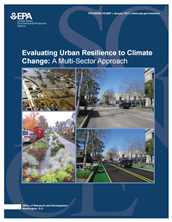Evaluating urban resilience to climate change: a multi-sector approach
 This report describes a comprehensive, transparent, and flexible tool that cities can use to identify the greatest risks, successes, and priorities for decreasing urban vulnerability and increasing resilience to climate change. Case studies were conducted with Washington, DC and Worcester, MA to provide examples of the tool’s application. Visualizations facilitate the interpretation of case study results and are intended to further assist city managers in moving to the next step of implementing climate change adaptation activities. The approach can be applied to a variety of different cities to help target and prioritize adaptation planning. The intended audiences for this report are local and state planners and managers engaged in the development and implementation of urban sustainability and resilience policies and practices, or anyone charged with developing and implementing climate change adaptation plans, and scientists working on climate change adaptation at the local level. Results support the usefulness of this indicator-based approach in identifying traits that enhance or inhibit each community’s resilience to focus adaptation planning on issues and areas that are least resilient to climate change impacts.
This report describes a comprehensive, transparent, and flexible tool that cities can use to identify the greatest risks, successes, and priorities for decreasing urban vulnerability and increasing resilience to climate change. Case studies were conducted with Washington, DC and Worcester, MA to provide examples of the tool’s application. Visualizations facilitate the interpretation of case study results and are intended to further assist city managers in moving to the next step of implementing climate change adaptation activities. The approach can be applied to a variety of different cities to help target and prioritize adaptation planning. The intended audiences for this report are local and state planners and managers engaged in the development and implementation of urban sustainability and resilience policies and practices, or anyone charged with developing and implementing climate change adaptation plans, and scientists working on climate change adaptation at the local level. Results support the usefulness of this indicator-based approach in identifying traits that enhance or inhibit each community’s resilience to focus adaptation planning on issues and areas that are least resilient to climate change impacts.
